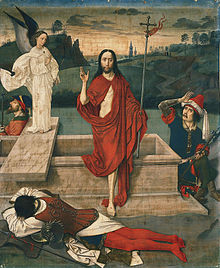Easter
![]()
The title of this article is ambiguous. For other meanings, see Easter (disambiguation).
At Easter (Latin pascha or Festum paschale, from Hebrew פֶּסַח pésach) Christians celebrate the feast of the resurrection of Jesus Christ.
In the early Church, Easter was celebrated as a unity of the remembrance of the Passion and the celebration of the Resurrection in the Easter Vigil, the night before Easter Sunday ("Vollpascha"). From the 4th century onwards, the highest feast in the church year was historically developed as a three-day celebration (Triduum Sacrum or Triduum paschale). Since then, therefore, in most liturgies the services have extended from the celebration of the Last Supper on Holy Thursday evening, through Good Friday with the commemoration of Jesus' suffering and death, and Holy Saturday, the day of the Lord's burial, to the dawn of the new week on Easter Sunday (liturgically Dominica Resurrectionis, "Sunday of the Resurrection" [of the Lord]).
Since the Passion, Death and Resurrection of Christ, according to the statements of the New Testament, fell in a Passover week, the date of this main Jewish festival also determines the date of Easter. It is determined by a lunisolar calendar and in the Western Church always falls on the Sunday after the first full moon of spring, in the Gregorian calendar therefore at the earliest on 22 March and at the latest on 25 April. The dates of the movable feast days of the Easter festival circle are also based on this.
Easter Sunday marks the beginning of the Paschal season of joy (Eastertide), which lasts fifty days up to and including Pentecost. In the Middle Ages, the original Triduum developed into a separate Easter Triduum, which set the first three days of the Easter Octave apart from the rest of the celebration week. Later, this non-working period was shortened until only Easter Monday remained as a public holiday.

Resurrection (Dieric Bouts, c. 1455)

Sale of Easter branches at the Viktualienmarkt in Munich
Designations
European languages
Many languages refer to Easter with a word derivation from the Aramaic pas-cha, borrowed from the Hebrew word Passover, among others:
- Albanian: pashkët
- Danish: påske
- Esperanto: Pasko
- French: Pâques
- Greek: πάσχα/pasha [ˈpasxa].
- in Icelandic: páskar
- Italian: Pasqua
- Catalan: Pasqua
- Dutch: Pasen
- in Norwegian: påske
- Low German: Paasken/Paasch(en)
- Portuguese: Páscoa
- Rhaeto-Romanic: Pasca/Pasqua
- Romanian: paști
- Russian: Пасха/Pasha [ˈpasxa].
- Swedish: påsk
- Spanish: Pascua
- Turkish: Paskalya
In northwest Germany, the term Paasken for Easter in Low German has survived to this day. This linguistic tradition points to the essential relationship of the death and resurrection of Jesus to the exodus of the Israelites from slavery and emphasizes the enduring rootedness of Christianity in Judaism.
Most West Slavic languages call Easter "Great Night (Great Nights)", in Polish Wielkanoc, Czech Velikonoce, Slovak Veľká noc and Slovenian Velika noč. By contrast, Belarusian uses Вялікдзень (Vyalikdsen), Ukrainian Великдень (Velykden), Bulgarian and Macedonian Великден (Velikden), and in earlier times Serbian Велигдан (Velikdan) meaning "Great Day" (Great Days), in the same way the Baltic languages Latvian Lieldienas and Lithuanian Velykos.
In both Sorbian languages, the word for Easter is Jutry (Upper Sorbian) and Jatšy (Lower Sorbian), respectively, and derives from the Slavic jutro ("the morning"). The Hungarian húsvét literally means "to eat meat", as does the Estonian lihavõte. The Georgian name აღდგომა (aghdgoma) means "resurrection" or "rising" in general German, as do the Croatian, Bosnian, and Serbian Uskrs (Cyrill. Ускрс).
Etymology
The introduction and cultivation of the term Easter in German is closely related to the structuring of the Frankish-German church provinces. These had different linguistic and clerical characteristics. In the archbishopric of Cologne, the Cologne ecclesiastical province, which was Frankish in character, the term pāsche predominated and was written in this way, especially in the documents that survive today. Boniface had Mainz as his episcopal see, and from the Anglo-Saxon tradition ôstarun was used there in the documents in Anglo-Saxon imitation as a typical missionary word.
The New High German Ostern and the English Easter have the same linguistic root, to whose etymology there are different approaches. The Duden dictionary of origins derives the word from the Old Germanic Austrō > Ausro "Morgenröte", which possibly denoted a Germanic spring festival and continued in Old English to Ēostre, Ēastre, in Old High German to ōst(a)ra, plural ōstarun. The root word is related to the ancient Greek name of the deified dawn Ēōs and the Latin aurora "dawn", which in turn influenced other languages. The underlying Indo-European root is the noun *h₂au̯s-os "dawn", derived from an Indo-European verbal root *h₂u̯es- "(to become light in the morning)" or *h₂au̯s- "(to draw from water), to fetch fire".
Ēostra is first documented in 738 by Beda Venerabilis (De temporum ratione 15). He is responsible for the assumption that the word referred to an Anglo-Saxon goddess of light, after whom the month of April was named in Anglo-Saxon Ēosturmanoth. The German Dictionary of the Brothers Grimm quotes him with the caveat that he may have invented this goddess-whose later name they assume to be Ostara. The hypothetical deity Ostara is viewed more skeptically today. It is more probable that Beda took up folk traditions that were cultivated in the context of early-year vegetation rites and were connected with the matron and disen cults and, moreover, were common in the pagan Germanic area of the time and are partly still handed down today.
Because of the discovery of the empty tomb of Jesus "early in the morning, just as the sun was rising" (Mk 16,2 EU), the dawn is a symbol of the resurrection in Christianity. The Canons Hippolyti (c. 350) therefore gave the instruction for the Easter Vigil: "Let all therefore watch until the dawn, then wash their bodies with water before celebrating Pascha, and let all the people be in light". This also tied into the biblical exodus tradition of the Israelites on the night of "passing over" (Passover in Hebrew): "A night of watching was it for the Lord when he brought them out of Egypt. As a night of watch to the glory of the LORD it is for the Israelites in all generations" (Ex 12:42 EU).
Honorius Augustodunensis (12th century) derived Easter from east (cf. English easter and east), the cardinal direction of sunrise. At that time, many new Christians were baptized "at sunrise" on Easter morning - Old High German for ostarun. This is also the point of departure for the name researcher Jürgen Udolph, who explains the word with reference to the Easter baptism date from the North Germanic word family ausa ("to pour") and austr ("to water"). Thus a pre-Christian water rite was called vatni ausa ("to water with water").
Another interpretation is based on the Latin term hebdomada in albis ("white week") for the Easter octave. Since alba loses the meaning "white" in the Romance languages and takes on the special meaning "morning light" or "dawn", this may have been rendered by the corresponding Germanic word.
Different definition of the date of Easter
→ Main article: Easter date
Easter is one of the movable festivals whose calendar date varies each year. Easter Sunday depends on the full moon of spring, and the beginning of spring is fixed on March 21, which is different from the astronomical date (March 19-21) and from the calculation according to the Jewish calendar.
After the First Council of Nicaea in 325 had decided on a first generally binding regulation, which now used the Julian calendar, Pope Gregory XIII had the Gregorian calendar introduced in the area of the Western Church in 1582. However, the Eastern Churches (with the exception of the Finnish Orthodox Church and the Eastern Syrian Church) remained with the Julian calendar, so that since then the date of Easter in Western Christendom can differ from that of the Orthodox and Ancient Near Eastern Churches by up to five weeks. The Easter feast of the Eastern and Western churches lies on the same day a total of only 27 times in this century.
All other movable Christian feasts are calculated from Easter Sunday.
Questions and Answers
Q: What is Easter?
A: Easter is a Christian holiday celebrating Jesus Christ returning from the dead. It is considered to be the holiest day of the year for Christians. Some people who are not Christian celebrate it as a cultural holiday.
Q: When does Easter occur?
A: Easter occurs on the first Sunday following the first full moon which is on or after March 21st, meaning it can occur as early as March 22 and as late as April 25.
Q: How do different churches calculate when Easter should be celebrated?
A: Western churches, like the Roman Catholic Church, use the Gregorian calendar while Eastern churches, like the Eastern Orthodox Church, use the Julian calendar. Despite this difference in calendars, both types of churches agree on how to calculate when Easter should be celebrated.
Q: What other events happen around Eastertime?
A: Around Eastertime there is a period of 50 days beginning from Easter Sunday to Pentecost Sunday and also Divine Mercy Sunday which falls on the first Sunday after Easter.
Q: Where does the word "Easter" come from?
A: The word "Easter" comes from Eastra, an ancient German Goddess of Spring whose festival occurred at the Vernal Equinox. The French word for Easter (Pâcques) comes from Greek word for Passover which is a Jewish holiday celebrated around this same time of year.
Q: In what years was/will be Easter celebrated on April 5th and April 21st?
A: In 2015, both Gregorian and Julian calendars celebrated Easter on April 5th while in 2019 they both celebrated it on April 21st
Search within the encyclopedia